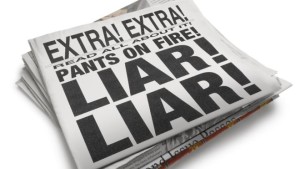The fake news epidemic has quickly become a major global concern. The consequences of a society saturated with fake news can be dangerous for a variety of reasons. Here are three ways YOU can help stop the spread of fake news:
fake news epidemic has quickly become a major global concern. The consequences of a society saturated with fake news can be dangerous for a variety of reasons. Here are three ways YOU can help stop the spread of fake news:
- Learn how to tell the difference between real and fake news articles. A recent post on the TED-Ed Blog provides some excellent advice on how to develop the skill of sifting through fake news. Once you’ve learned how to tell the difference, throw out fake news articles the minute you see them.
- Become familiar with the code of ethics for the Society of Professional Journalists (SPJ). If you know the standards that professional journalists are expected to live by, you will know what to look for when assessing the credibility of an author. You will also be able to help hold journalists to a higher standard by completely avoiding articles published by journalists who do not apply these principles. Knowing the standard of ethics for professional journalism will ultimately help you distinguish the difference between qualified journalists and unqualified journalists.
- Here are some important quotes to remember from the SPJ Code of Ethics:
- “Ethical journalism should be accurate and fair. Journalists should be honest and courageous in gathering, reporting and interpreting information.” Journalists should …
- “Take responsibility for the accuracy of their online prednisone 5mg work. Verify information before releasing it.”
- “Remember that neither speed nor format excuses inaccuracy.”
- “Provide context” and “Take special care not to misrepresent or oversimplify in promoting, previewing or summarizing a story.”
- “Gather, update and correct information throughout the life of a news story.”
- “Identify sources clearly. The public is entitled to as much information as possible to judge the reliability and motivations of sources.”
- “Consider sources’ motives before promising anonymity. Reserve anonymity for sources who may face danger, retribution or other harm, and have information that cannot be obtained elsewhere. Explain why anonymity was granted.”
- “Never deliberately distort facts or context, including visual information. Clearly label illustrations and re-enactments.”
- “Refuse gifts, favors, free travel and special treatment, and avoid political and other outside activities that my compromise integrity or impartiality, or may damage credibility.”
- “Distinguish news from advertising and shun hybrids that blur the lines between the two. Prominently label sponsored content.”
- Respond quickly to questions about accuracy, clarity and fairness.
- “Acknowledge mistakes and correct them promptly. Explain corrections and clarifications carefully and clearly.”
- “Expose unethical conduct in journalism, including within their organizations.”
3. Share this post to help friends and family become more informed on this issue. Fake news is only a danger to society if the public believes it, and an educated audience will not be fooled by fabricated news.

